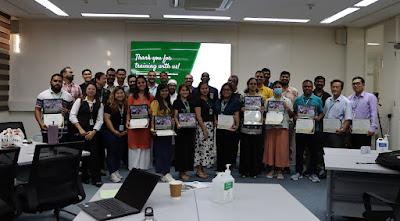Rice cultivation challenges continue to threaten the agrifood sector, especially in developing countries. In response, the International Rice Research Institute (IRRI) conducted training programs designed to enhance the skills of researchers, focused on genomic prediction in crop breeding and biotic stress resistance evaluation, which will empower them to apply advanced breeding tools and standardized methods to develop resilient rice varieties and address critical agricultural challenges in their respective countries.
In August, IRRI held a five-day training program on genomic prediction in crop breeding. The course had 20 participants, including three researchers from Cambodia, Laos, and Vietnam (CLV) sponsored by the Japan-ASEAN Integration Fund (JAIF).
The training focused on modern breeding techniques and tools, including R programming, quantitative genetics, and the application of genomic selection. Participants first visited IRRI’s Genotyping Services Lab to learn about the institute's current genotyping activities, followed by a tour of the International Rice Genebank, where they gained insights into essential rice genetic resources that may be valuable for developing varieties with diverse resistance traits.
The training improved participants' ability to use R for data analysis and increased their interest in plant breeding. Feedback was very positive, with many participants looking forward to using their new skills and recommending the course to others.
In October, 19 researchers from nine countries met for a two-week training on Biotic Stress Resistance Evaluation. This training also included three participants sponsored by JAIF from Cambodia, Laos, and Vietnam. The program helped participants learn how to identify, collect, isolate, and evaluate damages from major rice pests and diseases. The training combined lectures, laboratory exercises, and field visits to provide practical knowledge about managing pests and diseases.
Dr. Hans Bhardwaj, Research Director at IRRI, and Dr. Casiana Vera Cruz, former Senior Scientist at IRRI, highlighted the need for standardized screening methods to ensure consistent and reliable research worldwide. Participants found the training very useful and relevant to their work.
Participants from CLV highly recommended the course and commended the resource persons for their expertise and for providing a good and effective learning environment.
Suykim Eang, from the Cambodian Agricultural Research and Development Institute (CADRI), commented, “I am a breeder, so some pest and disease evaluations are very important for me for conducting the next experiments. I’ve learned that I can revive, sub-culture, and keep fungus in long-term storage for inoculation in future disease evaluation experiments.”
In summary, IRRI’s training programs reflect its commitment to advancing global rice research. Through expert guidance and hands-on experience, participants acquired valuable knowledge and skills to improve their work, making breeding activities and pest and disease resistance evaluations more efficient and impactful. With support from JAIF, Dr. Mary Jean Du, Breeding Lead for Southeast Asia at IRRI, played a key role in making these programs accessible to researchers from Cambodia, Laos, and Vietnam, fostering collaboration across the region. These efforts contribute to improving rice production and breeding, ultimately promoting more sustainable farming practices worldwide.
These training courses took place in August and October 2024 at the IRRI headquarters in Los Baños, Laguna.
###
Learn more about IRRI (www.irri.org) or follow us on social media and networks (all links down the right column).





No comments:
Post a Comment